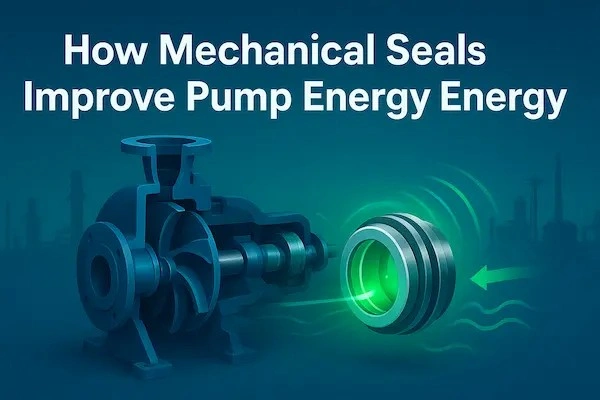Posted At: Oct 31, 2025 - 355 Views

How Mechanical Seals Improve Pump Energy Efficiency
In today’s industrial world, energy efficiency isn’t just a cost-saving measure — it’s a sustainability goal. Pumps are among the most common pieces of rotating equipment used in industries such as oil & gas, chemical processing, water treatment, and power generation. However, a significant portion of energy loss in pumps comes from leakage, friction, and maintenance inefficiencies. That’s where mechanical seals for energy efficiency come in.
Mechanical seals play a critical role in minimizing fluid leakage and frictional losses, helping pumps operate at their highest performance levels while consuming less power.
What Are Mechanical Seals and Why Do They Matter?
A mechanical seal pump uses a sealing device that prevents fluid from leaking out of the pump housing along the rotating shaft. Instead of relying on traditional packing materials, mechanical seals form a precise, controlled interface between rotating and stationary components. This design ensures the pump operates efficiently with minimal leakage and reduced energy waste.
By maintaining a tight seal and reducing friction, mechanical seals allow pumps to handle demanding applications while maintaining consistent performance — a key factor in energy efficiency.
How Mechanical Seals Improve Energy Efficiency
Let’s explore how mechanical seals directly contribute to improving a pump’s energy efficiency:
1. Reduced Friction Losses
In conventional packing systems, the friction between the packing rings and the rotating shaft generates heat and energy loss. Mechanical seals, on the other hand, are designed with smooth seal faces that glide effortlessly, reducing friction. This results in lower power consumption and extended equipment life.
2. Minimized Leakage
Every drop of leaked fluid means wasted energy. Mechanical seals create a near-perfect seal that minimizes leakage even under high pressure and temperature. This ensures that pumps deliver consistent output without losing energy through unwanted fluid escape.
3. Improved Shaft Alignment and Balance
A pump mechanical seal keeps the rotating shaft stable and properly aligned. Misalignment leads to vibration and higher energy usage. By maintaining balance, mechanical seals reduce vibration and energy losses, enhancing overall pump efficiency.
4. Enhanced Heat Management
Mechanical seals are engineered with materials that manage heat effectively. This reduces the thermal stress on pump components and prevents overheating, which can otherwise lead to energy inefficiency and premature wear.
5. Lower Maintenance and Downtime
When pumps use inefficient sealing methods, they often require frequent maintenance due to wear, leakage, or packing adjustments. Mechanical seals operate smoothly with less maintenance, which means less energy is wasted during downtime and fewer resources are spent on repairs.
6. Stable Performance Under Variable Conditions
In many industrial applications, pumps face changes in pressure, temperature, and flow. Mechanical seals maintain consistent sealing performance under these conditions, ensuring energy efficiency remains stable even during demanding operations.
Energy-Saving Benefits in Industrial Applications
Industries using mechanical seals experience measurable improvements in performance and energy savings. For instance:
Chemical and Petrochemical Plants: Reduced fluid loss and stable sealing lower operational costs and improve safety.
Water and Wastewater Treatment: Lower friction and reduced motor load enhance system efficiency.
Oil & Gas Industry: Mechanical seals prevent leakage of expensive and hazardous fluids, saving both energy and material costs.
Power Generation: High-temperature-resistant seals ensure uninterrupted performance, reducing overall energy waste.
Each of these sectors benefits from the optimized energy performance that mechanical seals provide.
The Role of Seal Design in Efficiency
Modern mechanical seals for energy efficiency are designed using advanced materials and precision engineering. Factors that influence seal efficiency include:
Seal Face Materials: Silicon carbide, carbon graphite, and tungsten carbide minimize wear and friction.
Lubrication Films: Thin liquid films between seal faces reduce heat generation.
Hydraulic Balance: Balanced seal designs reduce face load and power consumption.
Seal Configuration: Cartridge seals and double seals enhance reliability, reducing leaks and energy waste.
By combining these design principles, manufacturers like QMSeals ensure pumps deliver optimal performance while consuming less energy.
Sustainability and Long-Term Savings
Energy-efficient pumps not only lower electricity bills but also reduce carbon emissions and environmental impact. By installing high-quality mechanical seals, industries can:
Cut down on energy consumption
Extend pump service life
Reduce waste and environmental impact
Improve overall plant reliability
Thus, investing in quality mechanical seals is a long-term sustainable solution that supports both cost and energy savings.
Choosing the Right Mechanical Seal
Selecting the right seal is essential for achieving the desired energy efficiency. When choosing a pump mechanical seal, consider:
Operating temperature and pressure
Fluid compatibility
Pump speed and type
Application environment (corrosive, abrasive, etc.)
Consulting with a seal specialist like QMSeals ensures you get the best solution for your specific application, maximizing efficiency and reliability.
Conclusion
Mechanical seals do much more than prevent leakage — they play a vital role in improving pump energy efficiency. By reducing friction, maintaining pressure, and optimizing performance, these seals help industries save energy, lower costs, and enhance sustainability.
If your goal is to boost the efficiency and reliability of your pumps, choose QMSeals — a trusted manufacturer providing advanced mechanical seals for energy efficiency across industries.
Frequently Asking Questions
1. How do mechanical seals improve pump energy efficiency?
Mechanical seals reduce friction and prevent fluid leakage in pumps. This ensures smoother operation, lower power consumption, and minimal energy loss. As a result, pumps run more efficiently and require less energy to maintain pressure and flow.
2. Why are mechanical seals better than traditional packing for energy savings?
Traditional packing causes high friction between the shaft and packing rings, leading to energy waste and frequent maintenance. Mechanical seals, on the other hand, create a precise seal with minimal friction, improving performance and cutting energy costs.
3. Can using mechanical seals lower maintenance costs and downtime?
Yes. Since mechanical seals maintain stable sealing and require less frequent adjustments, they reduce maintenance needs and extend equipment life. Less downtime means more operational efficiency and reduced energy waste.


